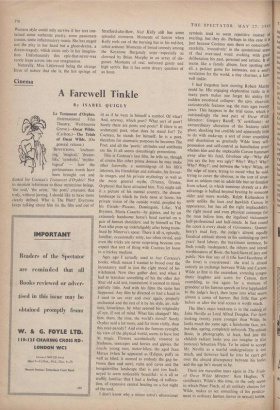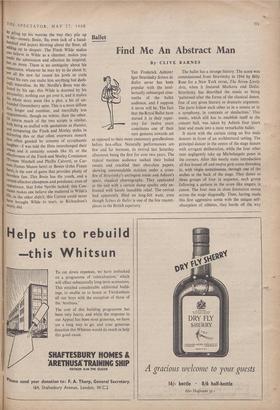Cinema
A Farewell Tinkle
By ISABEL QUIGLY Le Testament d'Orphee.
(International Film Theatre, Westbourne Grove.)—Oscar Wilde. (Carlton.)—The Trials of Oscar Wilde. (On general release.) 'BEWITCHING, 'enchant- ing,"magical,"dream- like,"symbolic,"mytho- logical' — how the portmanteau words have been brought out and dusted for Cocteau's Testament d'Orphee! Not to mention references to those mysterious beings, 'the soul,' the artist,' the poet,' creatures that truly, without jeering, I should like to have more clearly defined. Who is The Poet? Everyone keeps talking about him (in the film and out of it) as if he were in himself a symbol. Of what? And, anyway, which poet? What sort of poet? Surely there are poets and poets? If there is an archetypal poet, what does he stand for? To Cocteau, he stands for himself; he is a poet, therefore for cinematic purposes he becomes The Poet, and all the 'poetic' attitudes and attributes are his. It all seems disturbingly pretentiOus.
This is Cocteau's last film, he tells us, though of course like other prima donnas he may make other farewells; a summing-up of his life's interests, his friendships and attitudes, his favour- ite images, and his private mythology as well as the more general myths (Tristan, Orestes, Orpheus)• that have attracted him. You might call it a picture of his mental country, the dream- landscape in which he feels most at home, his private vision of the outside world, peopled by his friends—Picasso, Domingufn, Lifar, Yul Brynner, Maria .Casares—by gipsies, and by an extremely handsome horse's head carried on a pair of human shoulders; and by himself as The Poet who pops up indefatigably after being trans- fixed by Minerva's spear. There it all is, episodic, familiar, occasionally witty, too often trivial, and even the tricks are never surprising because you expect that sort of thing with Cocteau let loose in a tricksy medium.
Ages ago I actually used to buy Cocteau's books, which meant I wanted to brood over the incantatory stuff in just the right mood of be- witchment. Now they gather dust, and when I had to translate something of his the other day (that old acid test, translation) it seemed to mean pitifully little. And with his films the same has happened. Any film he directed or had a hand in I used to see over and over again, properly enchanted and the rest of it by his style, air, rich- ness, luxuriance, by what seemed his originality of eye, if not of mind. What has changed? Me, him, them, the time, the world's mood? Surely Orphee said a lot more, and far more richly, than this near-parody? And even the famous eyesight, his view of the physical world, seems to have lost its magic. Flowers acrobatically restored to freshness, seascapes and horses and gipsies, the louche young men, motor-bikes, the aged Jean Marais (when he appeared as (Edipus, puffy as well as blind, it seemed to embody the gap be- tween then and now), ruins and caves and the bougainvillea landscape that is just too. hack- neyed to seem noticeably beautiful: it is all so stuffily familiar that I had a feeling of suffoca- tion, of expensive central heating on a hot night of the soul.
I don't know why a minor artist's obsessional symbols tend to seem repetitive instead of exciting; but they do. Perhaps in this case it is just because Cocteau uses them so consciously, carefully, 'evocatively' in the quotational sense of that over-used word, evoking with great deliberation his past, personal and artistic. It all seems like a family album, face spotting and all, a parlour game for intimates, not a soul's revelation for the world; a tiny charmer, a fare• well tinkle.
I had forgotten how moving Robert Morley could be. His engaging elephantine rattle in so many parts makes one forget his ability for sudden emotional collapse : the spry, clear-cut, caricaturable features sag, the man ages twenty years This happens in the trial scene, which is outstandingly the best part of Oscar Wilde (director: Gregory Ratoff; 'X' certificate): an extraordinary alteration of the features takes, place, shocking but credible and apparently little to do with make-up, a sort of inner crumbling and dissolution as gradually Wilde loses self- possession and self-control as humiliation over- whelms him and the implacable Carson hammers away after his fatal, frivolous slip—Why did you say the boy was ugly? Why? Why? Why? Why? Why?', and between the 'whys' Wilde, on the edge of tears, trying to mend what he said, trying to cover the obvious, in the sort of situa- tion so seldom met in adult life but so familiar from school, in which someone already at a dis- advantage is bullied beyond bearing by someone older and more worldly. Ralph Richardson is quite unlike the lean and hawkish Carson in appearance, but has all the right implacability. the right moral and even physical contempt for the man before him, the legalised viciousness half-professional and half-innate. In fact round the court is every shade of viciousness: Queens- berry's mad fury, the judge's almost equally fanatical attitude shown in his summing-up (two years' hard labour, the "maximum sentence, he finds totally inadequate), the inborn and inbred worthlessness of Bosie, the hard faces of jury and public. Not that any of it (the hard-facedness of the time) is overstressed : the trial is almost entirely an exchange between Wilde and Carson, Wilde at first in the ascendant, arousing sympa- thetic laughter and scorn for Carson, then crumbling, to rise again for a moment of grandeur at his famous speech on love (applauded to the judge's fury), then lapse into what seems almost a coma of horror. But little that goes before or after the trial scenes is worth much.
The film's main weakness is in the casting of John Neville as Lord Alfred Douglas. Far from looking twenty years younger than Wilde, he looks much the same age; a handsome face, yes, but thin, ageing, completely unboyish. The odious Bosie, in photographs, at least, had just the childish radiant looks you can imagine in (for instance) Sebastian Flyte. To be asked to accept Mr. Neville as a tearful undergraduate is too much, and however hard he tries he can't get over the absurd discrepancy between his looks and the age he's meant to be.
There are masculine tears again in The Trials of Oscar Wilde (director : Ken Hughes; 'X' certificate), Wilde's this time, in the only scene in which Peter Finch, of all unlikely choices for Wilde, makes us see something of his predica- ment in ordinary human (never in sexual) terms, by Piling up his worries the way they pile up !la life—money, Bosie, 'flu, even lack of a hand- kerchief and papers blowing about the floor, all adding up to despair. The Finch Wilde makes you believe in Wilde as a charmer, makes you ?reirht the admiration and affection he inspired; out no more. There is no ambiguity about his aPPearance, whatever he may try to do about it; not all the new fat round his jowls or curls round his ears can make him anything but dash- ingly masculine. As Mr. Neville's Bosie was de- feated by his age, this Wilde is doomed by his personality; nothing can get over it, and it makes the whole story seem like a plot, a bit of un- founded Queensberry spite. This is a more diffuse 'ant, longer and ramblier, and mercifully less ePlgrammatic, though no wittier, than the other. of course much of the two scripts is similar, both being as stuffed with quotations as Hamlet, and comparing the Finch and Morley styles in delivering this or that often overworn remark (too often greeted by screams of sycophantic laughter—I was told the films interchanged their extras and it certainly sounds like it), or the effectiveness of the Finch and Morley Constances (Yvonne Mitchell and Phyllis Calvert), orCar- sL°t1s (James Mason here) or Bosies (John Fraser here), is the sort of game that provides plenty of harmless fun. This Bosie has the youth, and a certain effective cheapness and petulance, even of aPPearance, that John Neville lacked; this Con- lance makes one believe she mattered in Wilde's life, as the other didn't; this Carson could never have brought Wilde to tears, as Richardson's nearly did.







































 Previous page
Previous page